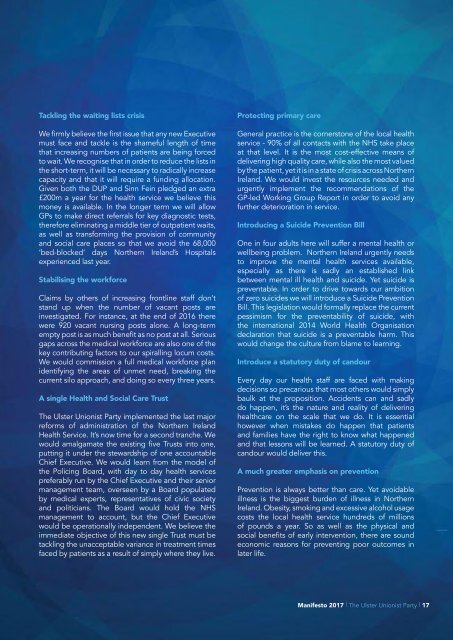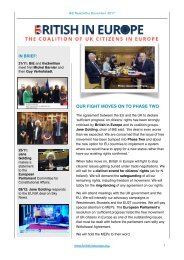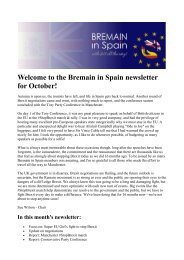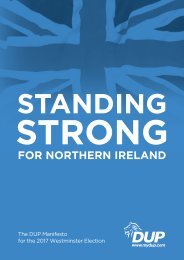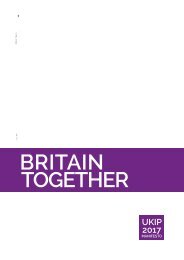Create successful ePaper yourself
Turn your PDF publications into a flip-book with our unique Google optimized e-Paper software.
Tackling the waiting lists crisis<br />
We firmly believe the first issue that any new Executive<br />
must face and tackle is the shameful length of time<br />
that increasing numbers of patients are being forced<br />
to wait. We recognise that in order to reduce the lists in<br />
the short-term, it will be necessary to radically increase<br />
capacity and that it will require a funding allocation.<br />
Given both the DUP and Sinn Fein pledged an extra<br />
£200m a year for the health service we believe this<br />
money is available. In the longer term we will allow<br />
GPs to make direct referrals for key diagnostic tests,<br />
therefore eliminating a middle tier of outpatient waits,<br />
as well as transforming the provision of community<br />
and social care places so that we avoid the 68,000<br />
‘bed-blocked’ days Northern Ireland’s Hospitals<br />
experienced last year.<br />
Stabilising the workforce<br />
Claims by others of increasing frontline staff don’t<br />
stand up when the number of vacant posts are<br />
investigated. For instance, at the end of 2016 there<br />
were 920 vacant nursing posts alone. A long-term<br />
empty post is as much benefit as no post at all. Serious<br />
gaps across the medical workforce are also one of the<br />
key contributing factors to our spiralling locum costs.<br />
We would commission a full medical workforce plan<br />
identifying the areas of unmet need, breaking the<br />
current silo approach, and doing so every three years.<br />
A single Health and Social Care Trust<br />
The <strong>Ulster</strong> Unionist Party implemented the last major<br />
reforms of administration of the Northern Ireland<br />
Health Service. It’s now time for a second tranche. We<br />
would amalgamate the existing five Trusts into one,<br />
putting it under the stewardship of one accountable<br />
Chief Executive. We would learn from the model of<br />
the Policing Board, with day to day health services<br />
preferably run by the Chief Executive and their senior<br />
management team, overseen by a Board populated<br />
by medical experts, representatives of civic society<br />
and politicians. The Board would hold the NHS<br />
management to account, but the Chief Executive<br />
would be operationally independent. We believe the<br />
immediate objective of this new single Trust must be<br />
tackling the unacceptable variance in treatment times<br />
faced by patients as a result of simply where they live.<br />
Protecting primary care<br />
General practice is the cornerstone of the local health<br />
service - 90% of all contacts with the NHS take place<br />
at that level. It is the most cost-effective means of<br />
delivering high quality care, while also the most valued<br />
by the patient, yet it is in a state of crisis across Northern<br />
Ireland. We would invest the resources needed and<br />
urgently implement the recommendations of the<br />
GP-led Working Group Report in order to avoid any<br />
further deterioration in service.<br />
Introducing a Suicide Prevention Bill<br />
One in four adults here will suffer a mental health or<br />
wellbeing problem. Northern Ireland urgently needs<br />
to improve the mental health services available,<br />
especially as there is sadly an established link<br />
between mental ill health and suicide. Yet suicide is<br />
preventable. In order to drive towards our ambition<br />
of zero suicides we will introduce a Suicide Prevention<br />
Bill. This legislation would formally replace the current<br />
pessimism for the preventability of suicide, with<br />
the international 2014 World Health Organisation<br />
declaration that suicide is a preventable harm. This<br />
would change the culture from blame to learning.<br />
Introduce a statutory duty of candour<br />
Every day our health staff are faced with making<br />
decisions so precarious that most others would simply<br />
baulk at the proposition. Accidents can and sadly<br />
do happen, it’s the nature and reality of delivering<br />
healthcare on the scale that we do. It is essential<br />
however when mistakes do happen that patients<br />
and families have the right to know what happened<br />
and that lessons will be learned. A statutory duty of<br />
candour would deliver this.<br />
A much greater emphasis on prevention<br />
Prevention is always better than care. Yet avoidable<br />
illness is the biggest burden of illness in Northern<br />
Ireland. Obesity, smoking and excessive alcohol usage<br />
costs the local health service hundreds of millions<br />
of pounds a year. So as well as the physical and<br />
social benefits of early intervention, there are sound<br />
economic reasons for preventing poor outcomes in<br />
later life.<br />
Manifesto 2017 | The <strong>Ulster</strong> Unionist Party | 17


